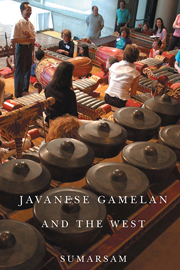Book contents
- Frontmatter
- Contents
- List of Illustrations
- Preface
- Acknowledgments
- Note on Orthography
- Introduction
- Part One Hybridity in Javanese Performing Arts
- 1 Performing Colonialism
- 2 Performing the Nation-State
- 3 Opera Diponegoro
- Part Two Gamelan as Intercultural Object
- Conclusion
- Notes
- Glossary
- Selected Discography
- Bibliography
- Index
1 - Performing Colonialism
from Part One - Hybridity in Javanese Performing Arts
Published online by Cambridge University Press: 05 September 2013
- Frontmatter
- Contents
- List of Illustrations
- Preface
- Acknowledgments
- Note on Orthography
- Introduction
- Part One Hybridity in Javanese Performing Arts
- 1 Performing Colonialism
- 2 Performing the Nation-State
- 3 Opera Diponegoro
- Part Two Gamelan as Intercultural Object
- Conclusion
- Notes
- Glossary
- Selected Discography
- Bibliography
- Index
Summary
In the introduction, I laid out a general premise of cultural hybridity: cultural contact that brings about a wide register of multiple identities and intensive cultural communication. In this chapter, I will begin my discussion with musical hybridity. But before I do so, it is useful to make note of a few key points about hybridity. One can think of hybridity either “as a space of liminality between two worlds (neither here nor there but in between) that can just as easily be emancipatory or tragic or as a source of potential strength since cultural hybrids can free themselves from the chains of tradition by adding on successive of layers of strategic identity.” The receiver of hybrid production is expected, Weiss writes, “to adjust his or her internal expectations about appropriation, agency, and authenticity.” Weiss goes on to say that “the highlighting of cultural mixture … situates issues of authenticity, ownership, purity, difference, and power, as unavoidable filters through which people of any cultures process the aesthetic impact of the production.” It is thus highly relevant that Ang, as quoted in the epigraph above, emphasize the presence of ambiguities and ambivalences in hybridity.
There are a few key questions to be considered: first, how is a particular hybrid music cultivated and developed in reaction to, and as a manifestation of, certain historical, socio-cultural, and regional phenomena? Secondly, what kinds of musical considerations might have taken place in the hybridization process?
- Type
- Chapter
- Information
- Javanese Gamelan and the West , pp. 11 - 25Publisher: Boydell & BrewerPrint publication year: 2013



